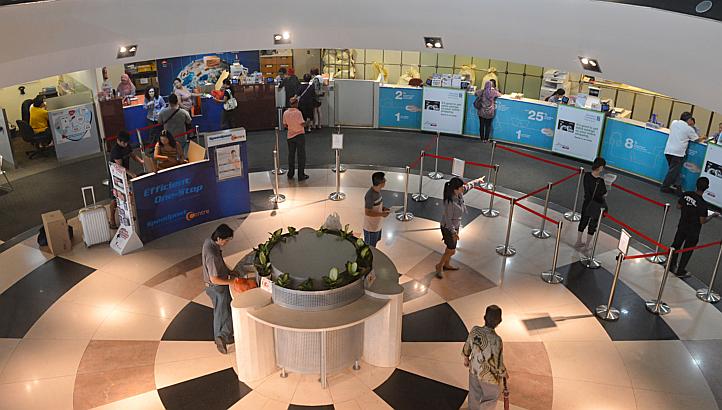Singapore’s almost 200 year old government owned postal agency has suddenly made a turn around to catch up with the e-commerce driven 21st century by ticking all the right boxes. They got themselves website, developed a strategy for marketing and went ahead to partner up with Triumph International and so on to deliver packages for online retailers instead of sticking to dwindling numbers of letters. The rapid death of the traditional mail system has now replaced by the crazy good looking numbers in the e-commerce sector and SingPost is evolving accordingly to cater to countries like its own Singapore and then Malaysia, China, Indonesia and even India.
SingPost has now built up an Amazon like framework with warehouses in different countries for easy deliveries for retail giants along with its traditional mail services. And not just sticking to delivering logistics to end consumers but also offers services to various companies like website development, online marketing and customer services. The e-commerce team at SingPost has been staffed with qualified Silicon Valley regulars who have made this ambitious move of SingPost a successful reality. From delivering Levi’s Jeans in South Korea, to handling Toshiba laptops in Singapore and Adidas sneakers in Malaysia, SingPost is doing all it can to survive and grow in this technology driven years.
Other government agencies are also following this model and trying to reinvent their services. Japan Post has gone ahead to buy Australia’s biggest logistics company Toll Holdings to compete with delivery giants like UPS and FedEx. The United States Postal Service that has been losing billions over the years has now started doing Sunday deliveries for Amazon. Australia has gone ahead to collaborate with Chinese retail giant Alibaba to help local businesses to flourish in market contact with China.
SingPost’s success has been noted by many in the industry. After the state owned company went public in 2003 to grow out of losses, it decided to walk towards making SingPost a digital force to reckon with. Alibaba has bought up 10% of SingPost in order to initiate an e-logistics venture covering Southeast Asia. SingPost’s evolution wasn’t a single wonder but a combination of trials and brainstorming. First it delivered goods for American retailers, and then tried opening its own online shop for luxury goods finally broadening its digital footprint in the last two years. Now SingPost services over 2000 retailers like includes Philips, Uniqlo, Deckers and Muji. SingPost has even built a singular facility completely dedicated to Xiaomi and working logistics for them.
SingPost’s office looks like a Silicon Valley tech start-up rather than what once was a government run facility bogged down by losses. From foosball to ping pong tables, an atmosphere conducive to the digital age helps inspire SingPost employees that are mostly experts from online bigwigs like Amazon and Hewlett-Packard.
The company also has an in-house customer service department with the strength of 30 or 40 employees on site with 24x7 connectivity; and 200 employees work from off-campus to ensure customer service is given utmost priority. By fixing Singapore as base, online retailers have found a lucrative way to connect to more than 600 million people based in Southeast Asia. The modern age is here and SingPost is evolving with it.
References:
http://www.nytimes.com/2015/05/19/business/international/singpost-reinvents-for-digital-age-of-ecommerce.html?ref=technology
SingPost has now built up an Amazon like framework with warehouses in different countries for easy deliveries for retail giants along with its traditional mail services. And not just sticking to delivering logistics to end consumers but also offers services to various companies like website development, online marketing and customer services. The e-commerce team at SingPost has been staffed with qualified Silicon Valley regulars who have made this ambitious move of SingPost a successful reality. From delivering Levi’s Jeans in South Korea, to handling Toshiba laptops in Singapore and Adidas sneakers in Malaysia, SingPost is doing all it can to survive and grow in this technology driven years.
Other government agencies are also following this model and trying to reinvent their services. Japan Post has gone ahead to buy Australia’s biggest logistics company Toll Holdings to compete with delivery giants like UPS and FedEx. The United States Postal Service that has been losing billions over the years has now started doing Sunday deliveries for Amazon. Australia has gone ahead to collaborate with Chinese retail giant Alibaba to help local businesses to flourish in market contact with China.
SingPost’s success has been noted by many in the industry. After the state owned company went public in 2003 to grow out of losses, it decided to walk towards making SingPost a digital force to reckon with. Alibaba has bought up 10% of SingPost in order to initiate an e-logistics venture covering Southeast Asia. SingPost’s evolution wasn’t a single wonder but a combination of trials and brainstorming. First it delivered goods for American retailers, and then tried opening its own online shop for luxury goods finally broadening its digital footprint in the last two years. Now SingPost services over 2000 retailers like includes Philips, Uniqlo, Deckers and Muji. SingPost has even built a singular facility completely dedicated to Xiaomi and working logistics for them.
SingPost’s office looks like a Silicon Valley tech start-up rather than what once was a government run facility bogged down by losses. From foosball to ping pong tables, an atmosphere conducive to the digital age helps inspire SingPost employees that are mostly experts from online bigwigs like Amazon and Hewlett-Packard.
The company also has an in-house customer service department with the strength of 30 or 40 employees on site with 24x7 connectivity; and 200 employees work from off-campus to ensure customer service is given utmost priority. By fixing Singapore as base, online retailers have found a lucrative way to connect to more than 600 million people based in Southeast Asia. The modern age is here and SingPost is evolving with it.
References:
http://www.nytimes.com/2015/05/19/business/international/singpost-reinvents-for-digital-age-of-ecommerce.html?ref=technology






